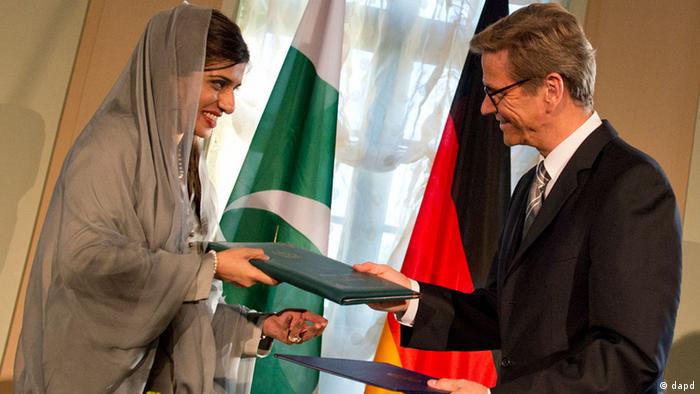M WAQAR..... "A man's ethical behavior should be based effectually on sympathy, education, and social ties; no religious basis is necessary.Man would indeed be in a poor way if he had to be restrained by fear of punishment and hope of reward after death." --Albert Einstein !!! NEWS,ARTICLES,EDITORIALS,MUSIC... Ze chi pe mayeen yum da agha pukhtunistan de.....(Liberal,Progressive,Secular World.)''Secularism is not against religion; it is the message of humanity.'' تل ده وی پثتونستآن
Thursday, September 6, 2012
Pakistan and Germany commit to strategic dialogue
Germany's foreign minister has said Afghanistan will not be forgotten after 2014 and that Pakistan was a crucial ally. He met his Pakistani counterpart in Berlin to set up a road map for closer political cooperation.
As NATO troops prepare to withdraw from Afghanistan by the end of 2014, the question of how to stabilize the war-torn country and build up a democracy is increasingly pressing. The international community particularly wants to prevent the country from once again becoming a base for terrorism.
And Pakistan is crucial, as German Foreign Minister Guido Westerwelle pointed out in talks with his Pakistani counterpart Hina Rabbani Khar on Tuesday in Berlin.
"Pakistan has a decisive role to play in the stability of the whole region," Westerwelle said. "We both know that without Pakistan, there will be no solution in Afghanistan and a stable Afghanistan is an objective that we both share."
Germany and Pakistan have now drawn up a "road map" for future meetings as part of their strategic dialogue.
Indispensable partner
With extremist groups operating on both sides of the Afghan-Pakistani border, Pakistan is considered an indispensable partner in the fight against terrorism.However, relations between Islamabad and the international community have been fraught in recent years. It is an open secret that Pakistan's Inter Services Intelligence (ISI) has maintained close ties with Islamist groups. Moreover, US drone attacks on terrorist targets in Pakistan have exacerbated the tension.
For a long time, Islamabad sought "strategic depth" in Afghanistan against a potential conflict with its arch-rival India. It also supported the Taliban as part of its security doctrine to acquire a long-term influence on Afghan foreign policy.
However, there seems to have been a change of strategy, says South Asia expert Christian Wagner from the German Institute for Security and Foreign Affairs in Berlin.
"People are beginning to realize that Pakistan, too, is suffering acutely from the conflict in Afghanistan," he told DW. "A number of Pakistani Taliban groups have emerged which are carrying out attacks in Pakistan. There has been a kind of foreign policy reality check in recent months."
The strategic depth approach has been replaced by more interest in a peaceful and stable Afghanistan.
Khar highlighted this during her meeting with the German foreign minister, saying it was in Pakistan's national interest to have "a pacified, prosperous and stable Afghanistan."
'No hidden agenda'
Khar also insisted that Pakistan had no hidden agenda regarding Afghanistan, which was a sovereign, independent state. She said that there had to be an "Afghan solution" to the conflict, without interference from other countries.
"We recognize German support for a peace process that will be driven forward and controlled by the Afghan side," she added, saying that Pakistan valued Germany's "deep understanding" and leading role.Although observers agree that Germany's role is limited, they welcome the move towards more strategic cooperation.
"Pakistan receives a great deal of German development aid already but this is about strengthening political talks and having a long-term 'road map' to decide how relations should be shaped in future," said Wagner.
He also pointed out that this was not only about Afghanistan but also about the role Pakistan would adopt with regard to its relations with Germany.
Subscribe to:
Post Comments (Atom)

No comments:
Post a Comment